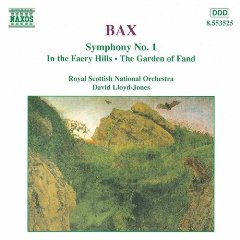Arnold Bax: Symphony No. 1 – Tone Poems (1996)
Arnold Bax: Symphony No. 1 – Tone Poems (1996)

01. In the Faery Hills [0:15:04.30] 02. The Garden of Fand [0:16:32.60] Symphonie Nr. 1 Es-dur 03. I. Allegro moderato e feroce [0:13:39.60] 04. II. Lento solenne [0:10:20.47] 05. III. Allegro maestoso - Allegro vivace ma non troppo presto - Tempo di marcia trionfale [0:08:26.15] Royal Scottish National Orchestra David Lloyd-Jones – conductor
This disc, very well recorded in 1996, is part of the series of Bax symphony recordings made by Naxos with these forces. The Scottish orchestra was brought right up to international standards by Jarvi and was recorded to good effect in those days by Chandos. Now the baton has been taken up by Naxos and it is a great pleasure to report that those very high orchestral standards have certainly been maintained. David Lloyd-Jones has created an enviable international reputation as a conductor of note so this series appears to have some exciting basic ingredients to offer.
The two poems, In the Faery Hills and The Garden of Fand are both works inspired by Bax's close identification with all things Irish. The symphony itself started life as an intended piano sonata but hugely outgrew that medium and thus became a symphony in greatly expanded form. It is cast in three movements and, although very lyrical in conception, it could be generally described as having significant elements of anger combined with sorrow. Although Bax did not clarify his thoughts in detail it is generally agreed that the symphony, completed in 1921-2, was strongly representative of his responses to the recently completed World War and the Irish Easter Rising of 1916. The anger he felt is implied in the opening Allegro moderato e feroce and the following Lento solenne. Continuing the theme of strife, the symphony concludes with Tempo di marcia trionfale.
The performances on this disc are significantly more driven than the Bryden Thompson set and quite a bit more than those of Handley. The Garden of Fand is also far better recorded and played than that in the respected but historic version by Barbirolli. --- I. Giles, amazon.com
download (mp3 @320 kbs):








